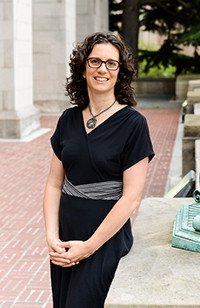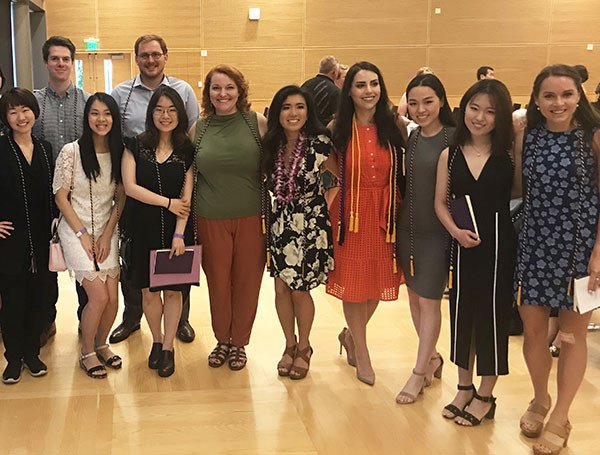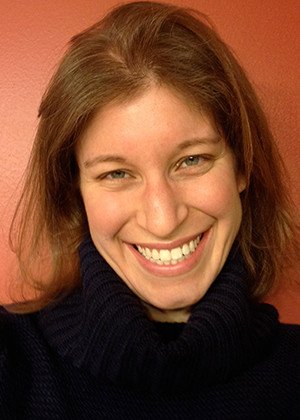Summer 2019
Published: 09/01/2019
Letter from the Chair
 |
| Cheryl Kaiser |
Hundreds of friends, family, and Psychology faculty and staff came together in June to celebrate the graduation of 500 of our undergraduate students! The Class of 2019 undertook exceptional learning opportunities in our department, as they interned in research labs where they worked hand-in-hand with graduate students, postdoctoral fellows, and faculty members exploring groundbreaking scientific projects that have been funded by the highest profile funding agencies in our nation. Some of our students engaged in clinical work, others in peer teaching, and were engaged in fieldwork all over the world. When you think about the scope of these experiences, it is apparent that these students had a truly remarkable undergraduate experience. Their time with us will provide them with the skills they need to thrive in their careers, any subsequent schooling, in their relationships, and in life. We are incredibly proud of the Class of 2019, and look forward to their accomplishments in the next stage of their lives.
June also marks our time-honored hooding ceremony, where we celebrate Psychology’s new PhD recipients. Our nineteen graduate students have been recognized with prestigious awards and fellowships from the National Institutes of Health (NIH), the National Science Foundation (NSF), and the Ford Foundation, among others. Our new PhDs will move to outstanding postdoctoral fellowships and faculty positions, will transform industry and government, and will bring evidence-based practices into therapeutic contexts all over the world. Generous support from our community of donors has given us increasing opportunities to fund fellowship opportunities for our graduate students, providing these students with dedicated time to pursue their research and develop their skills. There is nothing more special than seeing our students connect with the donors who made these opportunities possible, and watching our students share the joys of their discoveries.
Our faculty continue to bring great honor to our university with their research and are regularly the recipients of prestigious awards and grant funding, including earning over 11 million dollars in grant funding this year alone. This year was particularly special as Professor Kristina Olson was named a MacArthur Fellow, commonly referred to as the “genius award,” for her pioneering scholarship, which includes the Trans Youth Project. We also celebrated many promotions, including Ann Culligan to Senior Lecturer, Andrea Stocco to Associate Professor with tenure, and Sapna Cheryan, Shannon Dorsey, and Kristina Olson to Professor. This spring we also celebrated the careers of Drs. Steve Buck, Nancy Kenney, and Marsha Linehan on the occasion of their retirements. We are grateful for the decades of distinguished contributions they have made to our department and to the UW, and we wish them the best as they join our emeritus faculty ranks. You can learn more about our talented faculty elsewhere in this newsletter.
This year also marked the start of construction on a $45 million-dollar renovation of Kincaid Hall which, along with Guthrie Hall, will consolidate nearly all of our faculty into two buildings. Kincaid Hall will host a number of faculty research labs and centers, the Psychology Services and Training Center, undergraduate learning spaces, and a state-of-the-art MRI center which will serve as a neuroscience hub for the broader campus community. We’re excited for the opportunity to bring our department together in two nearly contiguous spaces as we have long been vastly spread out across campus.
Thank you to our supporters for keeping Psychology thriving amidst challenging times in our federal and state budgets. Our student endowments and gifts, which delivered over $150,000 this year, represent a particularly vital investment in the future of Psychology. We are also working toward fully funding the Marsha M. Linehan Endowed Chair campaign, which was launched this year with a generous $1.5-million-dollar gift from our supporters. If you would like to support these and other endeavors, as well as explore naming opportunities in Kincaid Hall, please reach out.
After an unusually rainy start to the Seattle summer, we’ve now hit our stride, and I wish you well and hope you will keep in touch.
All the best,
Cheryl R. Kaiser
Professor & Chair
Featured Articles
Graduate Student Spotlight: Jessica Canning
 |
Jessica Canning (Adult Clinical Area with Mary Larimer) is our latest student to receive predoctoral funding from NIAAA (NRSA, or National Research Service Award) for her research on risk factors with heavy alcohol use. The background of this research award was covered in a previous article. Learn more about Jessica below!
Let's start with the basics, where are you from and where did you complete undergrad/masters?
I grew up in Phoenix, Arizona and completed my undergrad at Arizona State University.
How did you wind up at UW/why did you apply here? What do you think about living in Seattle?
I was first interested in UW because of my advisor, Mary Larimer, and her work. I decided to stay because of the laid back vibe and strong collaborative environment at UW. I really enjoyed the people I was hoping to work with, and our program is rich with opportunities I wasn’t going to get elsewhere. Seattle has been a wonderful. It’s so easy to escape into nature, and there’s so much to explore here.
What is your research interest and how did you get into it (what inspires/motivates you)?
I’m interested in risk factors for heavy alcohol use. I’m inspired by all the amazing mentors I’ve had who paved the way and really supported my research ideas. Seeing all the strong women coming up in academia within the addictions field has motivated me in my career choices greatly and influences my pursuit of an academic career.
How did you learn about your funding opportunity and tell us about the application/waiting process?
I first learned about NRSA Fellowships in undergrad and knew I would pursue one as a graduate student. Additionally, my lab has a seminar dedicated to grantsmanship that really gave me a jump start on the process. The application and waiting isn’t easy but it’s worth it. I would definitely say delayed gratification is a necessary skill in grant writing. Each step moves slower than you’d expect, so give yourself time and start early.
How did you feel when you learned that your application was accepted and that you will receive funding?
I couldn’t believe it to be honest. I was excited and awe-struck because this meant I finally get to do my own research. I immediately went out to celebrate by going to a fancy dinner.
What is the name of your project and the funding source?
My project is a National Research Service Award (NRSA) from NIAAA entitled, “Peer Groups and Broad Social Motives’ Influence on College Student Drinking: A Multimethod Approach Using Alcohol Administration and Daily Diary”
How might your research change the world?
My research will help inform the development of prevention for alcohol use among young adults. By understanding how peers influence drinking behavior, we can incorporate more social contextual information into brief interventions rather than only focusing on the individual.
Do you have any advice/tips/suggestions for others who may apply to this opportunity? About graduate study in general?
In addition to starting early, get lots of feedback. I was lucky enough to have some mock review sessions with faculty in my lab and it really helped the project along. I recommend requesting recently funded examples from students but don’t forget to double check the specific requirements in the current funding announcement because they change often.
What do you hope to accomplish with the funding and/or while in the UW Psychology graduate program?
I hope to receive the training needed to manage my own lab after graduate school. On this project I will be co-mentoring several undergraduate students and managing both experimental and survey research. This will set me up for my future career as an academic researcher.
What do you like doing in your spare time?
I love hanging out with my dog, Nala. We spend most of our afternoons at the park and exploring Seattle.
The last book and/or movie you saw and enjoyed?
Avengers: Endgame. “Avengers… assemble” – Steve Rogers
What do you plan to do once you complete your PhD?
I plan to go on to a post-doc and eventually a faculty research position at a large university or in a research medical setting. I hope to continue pursuing grants to fund my future research interests and teach students.
Supplemental Reading:
End of the Year Milestones
The end of each academic always brings a rush of activity and the bittersweet moments of saying goodbye to graduating students who have become part of the UW Psychology family. It is also a time to celebrate the accomplishments of all of our outstanding graduates. Both the Undergraduate Honors Poster Session and the Psychology Graduation Celebration are end of the year milestones that mark our students transitions from Psychology majors to alumni.
 |
| Graduating honors students with Dr. Chantel Prat |
In late May, members of the 2019 Psychology Honors cohort showcased the results of their research. The Honors Poster Session, along with the completion of a senior thesis, marks the culmination of a two-year intensive research program. The Department joins with Honors Program director Dr. Chantel Prat in congratulating our students on this impressive accomplishment: Izzi Batt-Doyle, Aarti Bodas, Lauren Hall, Micah Ketola, Ling Wai Lam, Xuanxuan (Kari) Li, Jiafei Li, Vanessa Lim, Akira Sakoda, Isabelle Tully, Heather Wessel, Josh Wolfe, Yinan Xu, and Chia-li Yu. See more information in the Poster Session program here (add link to poster session program pdf). Also of note, 78 Psychology majors took part in this year's campus-wide Undergraduate Research Symposium.
Over 500 students earning their Bachelor's degree in Psychology over the course of this year was definitely cause for a party. On June 13, Psychology Department faculty and staff came together with hundreds of family members and friends to recognize those individuals making the transition from students to alumni. The Psychology Graduation Celebration, hosted by Psychology Department Chair Dr. Cheryl Kaiser, included awards and recognititions, student speakers, and individual recognition of all graduates in attendance. Talks by this year's student keynote speakers - Pelumi Ajibade, Honson Ling, and Katherine Magnuson - were moving and inspirational. Learn more of each of our keynote speakers here.
Faculty Spotlight: Welcome Dr. Cynthia Levine
 |
| Cyntia Levine |
Recently we had a chance to sit down and interview one of our newest faculty members, Dr. Cynthia Levine, who is an Assistant Professor in the area of Social and Personality. She joined the psychology department in the winter of 2019.
How did you become interested in the field of psychology and more specifically in social and health psychology?
I took my first psychology class in college, partly to fulfill a requirement, and I was hooked! I loved being able to study the psychological phenomena that I was observing around me. My first experiences with research as an undergraduate were fantastic, and I decided to go to graduate school in social psychology. My research in graduate school focused on a number of questions related to stereotyping, prejudice, diversity, and culture. Towards the end of graduate school, I also became involved in some research looking at health outcomes, and I decided I wanted to learn more, so I went on to do a postdoc in a health psychology lab. Now my research combines both approaches.
2) What draws you to your work? Why are you passionate about it?
My lab’s research focuses on the social and psychological experiences which are linked to better health outcomes among people from diverse backgrounds. I’m especially interested in thinking about how to leverage this knowledge to improve the health of people from lower status or stigmatized groups and to reduce disparities in risk for cardiovascular disease and other chronic diseases of aging. I have a longstanding interest in inequality based on race, gender, socioeconomic status, and other identities, and I’m passionate about understanding more about the social psychological sources of health disparities and, ultimately, how to foster more equality.
3) Why is your lab’s research important? Why should the community care?
As I noted above, my research focuses on understanding the social psychological factors that promote health among people from diverse backgrounds and on reducing health disparities. Health is an important outcome in its own right, and it also has implications for a number of other domains. For instance, poor health can affect people’s ability to attend school or work or actively engage with their communities. Thus, my work is relevant to anyone interested in promoting health and well-being in society and in promoting more equitable outcomes in many different domains.
4) Your recent work published in the Proceedings of the National Academy of Sciences shows that students of color have better health when they attend schools that emphasize the value of diversity. What type of health disparities occur in less diverse school climates and how might your work inform public health and policy on the value of diverse school climates?
There are racial disparities in who develops many chronic diseases of aging. For example, relative to Whites, African Americans are more likely to develop cardiovascular disease and diabetes, and Latino/as are more likely to develop diabetes. Risk factors for some of these diseases begin to develop in adolescence. In our sample, adolescents of color who attended schools that did not have a culture of emphasizing the value of diversity had higher levels of metabolic syndrome, insulin resistance, and inflammation, which are all markers that indicate risk for cardiovascular disease and diabetes later on in life. However, in schools with a more inclusive climate around diversity, students of color have levels of these markers that indicate lower risk. Specifically, in schools whose mission statements explicitly mentioned valuing diversity—which we show are also schools where students of color fare better academically and are disciplined at lower rates—students of color are healthier. We’re currently doing follow up research to understand more about what is happening for students of color in these schools, but we think that there might be more faculty of color, more diverse perspectives in the curriculum, and more equitable treatment of students from different backgrounds, all of which could help students of color feel more supported and, in turn, to have better health. If that’s true, changing school environments to be more inclusive in these ways would have the potential to improve the health of adolescents of color and reduce health disparities.
Is there anything else you would like to add about your work and/or the classes that you plan to teach?
This year I taught a course on the psychology of health disparities, which focused on the social and psychological roots of health disparities based on race and ethnicity, socioeconomic status, gender, sexual orientation, gender identity, geographic location, whether one has a disability, and other identities and experiences, and on how to address some of these disparities. It was a lot of fun, and I will be teaching it again next winter. I will also be teaching an undergraduate health psychology course in the spring next year.
Support a Psychology Student Through Huskies@Work
Calling all alum: now you can help a student with Huskies@Work, UW Alumni Association’s job shadowing program.
Psychology is one of the most dynamic majors on campus: with a degree under their belt, students can pursue careers in research, therapy, business, community health, technology, and many other fields. As an alum, you can play a part in their path to choosing a career by showing them what can be possible after graduation.
Huskies@Work is offered twice each year, during one month in the fall and one month in the spring. Alumni and students fill out applications and are matched based on career field and interests. Together, you decide on a mutal date and time and you’ll get the chance to share a day in your life. From meetings to site visits, informational coffees to meetings over Skype or phone call — you can show a fellow Dawg what it’s like to walk in your shoes.
Fall 2019 session applications open on August 19th. Learn more and get involved today on the Huskies@Work website.
Looking for more ways to connect with UW Psychology post-grad and beyond? Visit the department website and stay connected with us today.